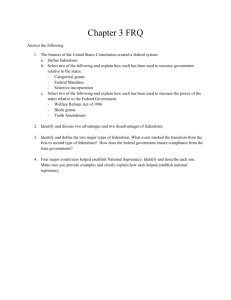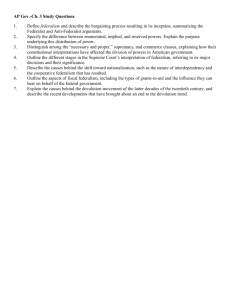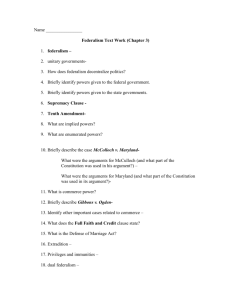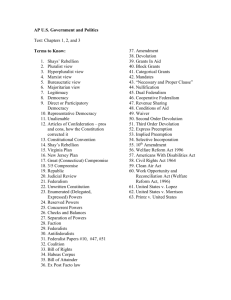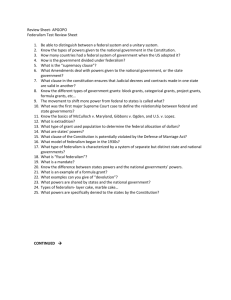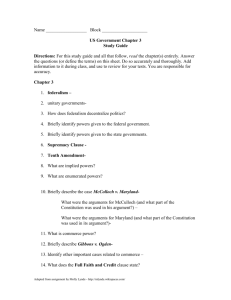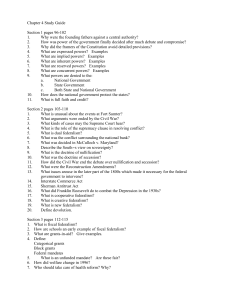ap government: unit 3 federalism test
advertisement
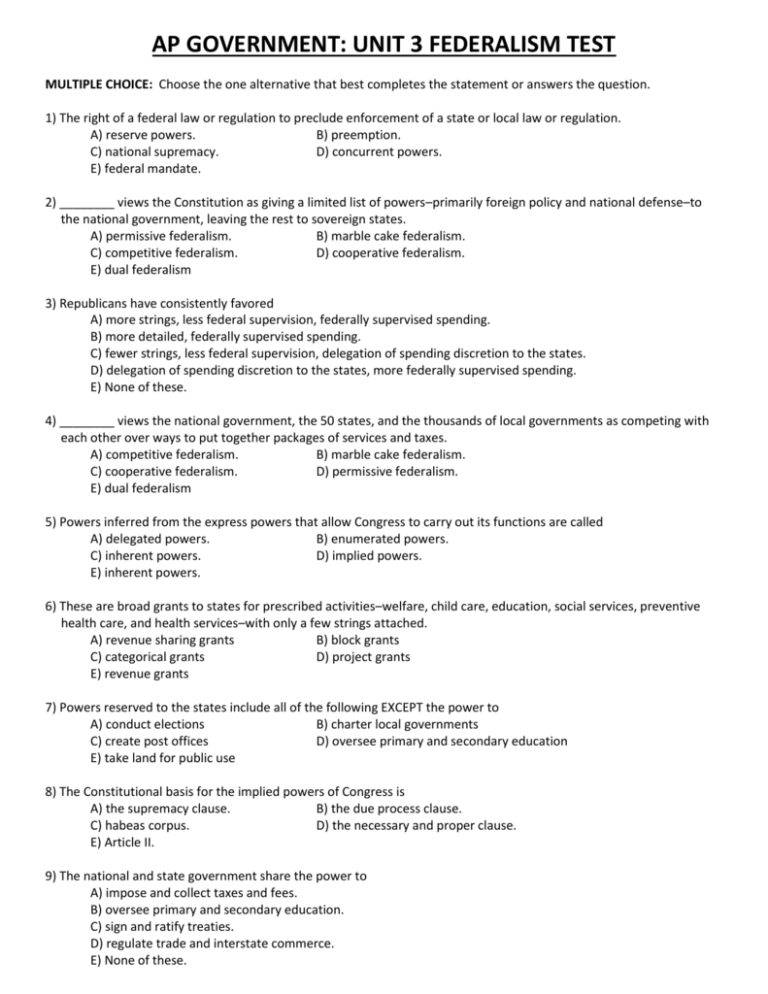
AP GOVERNMENT: UNIT 3 FEDERALISM TEST MULTIPLE CHOICE: Choose the one alternative that best completes the statement or answers the question. 1) The right of a federal law or regulation to preclude enforcement of a state or local law or regulation. A) reserve powers. B) preemption. C) national supremacy. D) concurrent powers. E) federal mandate. 2) ________ views the Constitution as giving a limited list of powers–primarily foreign policy and national defense–to the national government, leaving the rest to sovereign states. A) permissive federalism. B) marble cake federalism. C) competitive federalism. D) cooperative federalism. E) dual federalism 3) Republicans have consistently favored A) more strings, less federal supervision, federally supervised spending. B) more detailed, federally supervised spending. C) fewer strings, less federal supervision, delegation of spending discretion to the states. D) delegation of spending discretion to the states, more federally supervised spending. E) None of these. 4) ________ views the national government, the 50 states, and the thousands of local governments as competing with each other over ways to put together packages of services and taxes. A) competitive federalism. B) marble cake federalism. C) cooperative federalism. D) permissive federalism. E) dual federalism 5) Powers inferred from the express powers that allow Congress to carry out its functions are called A) delegated powers. B) enumerated powers. C) inherent powers. D) implied powers. E) inherent powers. 6) These are broad grants to states for prescribed activities–welfare, child care, education, social services, preventive health care, and health services–with only a few strings attached. A) revenue sharing grants B) block grants C) categorical grants D) project grants E) revenue grants 7) Powers reserved to the states include all of the following EXCEPT the power to A) conduct elections B) charter local governments C) create post offices D) oversee primary and secondary education E) take land for public use 8) The Constitutional basis for the implied powers of Congress is A) the supremacy clause. B) the due process clause. C) habeas corpus. D) the necessary and proper clause. E) Article II. 9) The national and state government share the power to A) impose and collect taxes and fees. B) oversee primary and secondary education. C) sign and ratify treaties. D) regulate trade and interstate commerce. E) None of these. 10) When the federal government orders states and local governments to act without providing federal funds it is called A) an unfunded mandate. B) crossover sanctions. C) cross-cutting requirements. D) direct orders. E) total and partial preemption. 11) Powers that the Constitution gives to both the national and state governments, such as the power to levy taxes. A) reserve powers B) concurrent powers C) federal mandate D) preemption E) national supremacy 12) States are prohibited from A) borrowing money. B) take land for public use. C) making treaties with foreign governments. D) establishing state police agencies without congressional approval. E) creating units of local government. 13) The National Supremacy Clause is interpreted to mean A) the nation may not override state policies. B) state constitutions take precedent over the national constitution. C) national policies are only enforceable with the permission of the states. D) states may not override national policies. E) only cities may override state policies. 14) The Supreme Court Case that defined commerce to allow for the national regulation of economic activities was A) Marbury v. Madison B) McCulloch v. Maryland C) Gibbons v. Ogden D) Connors v. Warr E) US V. Lopez 15) Funds appropriated for specific purposes, such as school lunches or the building of highways or airports, which are allocated by formula and subject to detailed federal conditions are called A) revenue sharing grants. B) block grants. C) project grants. D) revenue grants. E) categorical grants. 16) ________ presumes that the power of the federal government is limited in favor of the broad powers reserved to the states. A) permissive federalism. B) "our federalism". C) cooperative federalism. D) competitive federalism. E) dual federalism 17) In a ________ system of government, sovereign nations through a constitutional compact, create a central government but carefully limit its authority and do not give it the power to regulate the conduct of individuals directly. A) confederation B) constitutional C) unitary D) federal E) socialistic 18) ________ views federalism as a mixed set of responsibilities in which all levels of government are engaged in a variety of issues and programs. A) permissive federalism. B) competitive federalism. C) marble cake federalism. D) dual federalism E) cooperative federalism. 19) Federalism is ideally suited to the needs of A) people who are suspicious of concentrated power B) people who desire unity but not uniformity C) a diverse people D) people spread over a large continent E) All of these. 20) People who favor state or local action rather than national action. A) centralists B) states' rights advocates C) lobbyists D) decentralists E) B and D 21) In which of the following would the three groups most likely agree with one another? A) federalists, decentralists, present-day liberals. B) antifederalists, social conservatives, centralists. C) centralists, states' rights advocates, antifederalists. D) states' rights advocates, centralists, contemporary liberals. E) decentralists, states' rights advocates, antifederalists. 22) Which of the following did not foster the growth of "Big Government" in the 20th century? A) wars B) settlement of the West C) industrialization D) the Great Depression 23) ________ is a form of government in which a constitution distributes powers between a central government and smaller regional governments. A) Constitutional Monarchy B) Confederation C) Federalism D) Union or Unitary System E) Socialism 24) All powers not specifically delegated to the national government by the Constitution are called A) federal mandate B) preemption. C) concurrent powers. D) reserve powers. E) national supremacy. 25) The case of McCulloch v. Maryland (1803) involved A) the right of a state to succeed from the Union. B) the power of the president to declare war. C) the right of a state to tax the federal government. D) the right of an individual to sue a state. E) the right of an individual to levy a tax 26) Which of the following is the best example of devolution? A) The McCullough v. Maryland case, which allowed the federal government to maintain a national bank. B) Civil rights legislation mandating that states not discriminate C) Block grants, by which money from the national government is given to the states for discretionary use with broad guidelines. D) The federal tax code, which provides deductions for local charities. E) The No Child Left Behind law, which provides states with monetary incentives for meeting national educational guidelines 27) All of these are advantages of federalism EXCEPT: A) it reduces the amount of experimentation on public policy B) it allows customization of policies for local needs. C) it increases access to government. D) it allows more opportunities for political participation. E) it allows for a greater diversity of opinion to be reflected in public policies. 28) The new Republican majority in Congress in the 1990s preferred block grants to categorical grants because it: A) intended to raise more money from state governments to reduce the federal budget deficit. B) wanted to increase federal aid to state governments. C) wanted federal money to be spent at the neighborhood level rather than the state level. D) wanted the federal government to exercise less authority over the states. E) wanted to decrease federal aid to state governments. 29) The principle of the supremacy of federal law over state law was affirmed in A) the Tenth Amendment. B) Marbury v. Madison. C) United States v. Lopez. D) McCulloch v. Maryland. E) the presidential election of 1800. 30) In U.S. v. Lopez (1995), the Supreme Court ruled that congress overstepped its power to regulate commerce by prohibiting __________in a school zone. A) cigarette sales B) adult bookstores C) guns D) alcohol sales E) dog races 31) Federal mandates impose burdens upon: A) foreign governments. C) the President. E) state and local governments. B) federal taxpayers. D) Congress. 32) A categorical grant is a transfer of federal funds designed for A) specific purposes B) the private sector C) discretionary use by a state D) programs with matching grants E) the accomplishment of broad goals 33) Various pollution control laws require the states to comply with federal standards for clean air, pure drinking water, and sewage treatment. These provisions are examples of A) conditions-of-aid B) mandates C) block grants D) categorical grants E) devolution 34) The doctrine of nullification refers to A) the power of Congress to veto state laws that violate the U.S. Constitution. B) the claimed authority of the states to declare a federal law void for violating the U.S. Constitution. C) the power of the president to veto state laws for violating the U.S. Constitution. D) the authority of the president to dissolve Congress and to call for new elections. E) the power of the federal government to invalidate state laws on matters of commerce. 35) When the federal government gives states money for a general purpose like “transportation” or “urban development” and has only a few strings attached it is called A) a categorical grant. B) a project grant. C) a formula grant. D) a block grant. E) revenue sharing. 36) The Republican effort to pass on to the states many federal functions is known as A) fragmented federalism. B) marble-cake federalism. C) devolution. D) evolution. E) preemption. TRUE/FALSE: Bubble in “A” if statement is true and “B” if the statement is false. 37) Federalism encourages experimentation because if states adopt programs that fail, the negative effects are limited; if programs succeed, they can be adopted by other states and by the national government. 38) The clause in the Constitution that gives Congress the power to regulate all business activities is called the necessary and proper clause. 39) Federalism allows unity without uniformity because national politicians and parties do not have to iron out every difference on every issue that divides us; these issues are debated in state legislatures, county courthouses, and city halls. 40) The Constitutional base for the implied powers of Congress is the supremacy clause. 41) In 1787, Federalism was a compromise between centrists, who supported a strong national government, and those who favored decentralization. 42) Federalism keeps government closer to the people by providing numerous arenas for decision making and engaging many people in the process of government. 43) When a state accepts federal grants, it is subject to certain rules established by the federal government. 44) State governments have more power in a federal system than in a unitary system. 45) Centralists believe changes to the U.S. Constitution should go through the formal amendment process rather than informal processes. AP GOVERNMENT UNIT 3 FEDERALISM ANSWER KEY 1) B 2) E 3) C 4) A 5) D 6) B 7) C 8) D 9) A 10) A 11) B 12) C 13) D 14) C 15) E 16) B 17) A 18) C 19) E 20) E 21) E 22) B 23) C 24) D 25) C 26) E 27) A 28) D 29) B 30) C 31) E 32) A 33) B 34) B 35) D 36) C 37) TRUE 38) FALSE 39) TRUE 40) FALSE 41) TRUE 42) TRUE 43) TRUE 44) TRUE 45) FALSE
